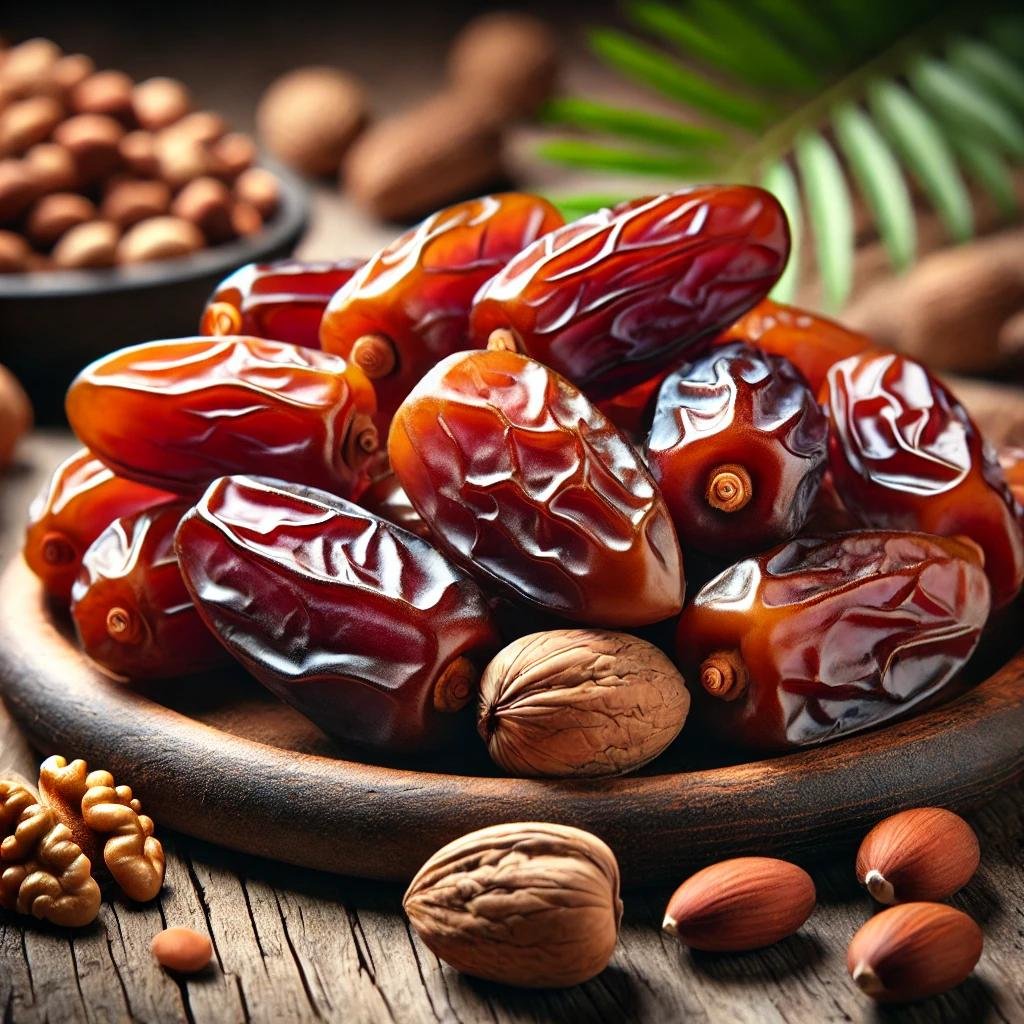The Sweet Superfood Every Woman Over 40 Needs
The Sweet Superfood: Health Benefits of Dates for Women Over 40
Dates, often called "nature's candy," have been enjoyed for centuries as a delicious and nutrient-packed fruit. For women over 40, dates are an excellent way to boost energy, support digestive health, and promote overall well-being. Packed with essential vitamins, minerals, and fibre, they’re a simple addition to your diet that can make a big impact on your health.
Nutritional Benefits of Dates
Dates are a powerhouse of nutrients, providing a host of health benefits. They are rich in fibre, which aids digestion, promotes satiety, and helps stabilise blood sugar levels. They are also an excellent source of potassium, essential for heart health and muscle function, and magnesium, which plays a vital role in bone health and reducing inflammation. Vitamin B6 supports brain health and combats fatigue, while the antioxidants in dates help reduce oxidative stress and inflammation. Studies confirm that dates have a low to moderate glycaemic index, making them a suitable choice for moderate consumption, even for those monitoring blood sugar levels (Alkaabi et al., 2011).
Why Dates Are Ideal for Women Over 40’s Health
As women approach menopause, their bodies require targeted nutrition to maintain hormonal balance, bone strength, and cognitive function. Dates align perfectly with these needs. Natural sugars in dates like glucose, fructose, and sucrose provide a quick energy boost, ideal for combating fatigue. Minerals such as magnesium and selenium contribute to maintaining bone density, reducing the risk of osteoporosis. Fibre-rich dates improve digestive health, easing constipation and promoting a healthy gut microbiome. Their antioxidants and vitamin B6 support cognitive health, reducing brain fog and promoting mental clarity (Baliga et al., 2011).
How to Include Dates in Your Diet
Dates are incredibly versatile and easy to incorporate into your daily meals:
Snack pairing: Combine dates with nuts for a balanced mix of carbohydrates, protein, and healthy fats.
Smoothies: Blend them into smoothies for natural sweetness and added fibre.
Sugar substitute: Use dates as a natural sweetener in baking by blending them into a paste.
Salads: Chop them into salads for a touch of natural sweetness.
Stuffed dates: Fill dates with nut butter or cream cheese for a satisfying snack.
Energy balls: Mix dates with oats, nuts, and seeds to create homemade energy bites, perfect for on-the-go nutrition.
These methods allow you to enjoy the health benefits of dates while adding variety to your diet.
Which Dates Should You Choose?
There are many varieties of dates available, each with unique characteristics:
Medjool Dates: Large, soft, and sweet with a caramel-like flavour, making them perfect for snacking or desserts.
Deglet Noor Dates: Firmer and less sweet, ideal for cooking or baking.
Ajwa Dates: Smaller and often valued for their medicinal properties, packed with antioxidants.
When purchasing dates, choose organic varieties free from added sugars or preservatives. Look for plump, shiny dates, which indicate freshness.
Are Dates Healthy Despite Their Sugar Content?
While dates are naturally high in sugar, their fibre content slows sugar absorption, preventing blood sugar spikes. Consuming 2–4 dates per day provides nutritional benefits without overloading on sugar. Pairing dates with a protein or fat source, such as nuts, further moderates their impact on blood sugar levels. This balance makes them an excellent choice for those managing weight or monitoring glucose levels.
A Sweet Addition to a Healthy Lifestyle
Dates are more than just a tasty treat. They are a nutrient-dense superfood that can support energy, digestion and overall health. Whether eaten alone, added to recipes, or used as a natural sweetener, dates are a versatile and beneficial addition to your diet. Start including them today and experience the difference they can make in your health.
Ready to take control of your health? Sign up for Health Bites for Women Over 40 and get expert tips, recipes, and wellness insights delivered straight to your inbox. Start your journey to feeling amazing today! Link below.
References
Alkaabi, J. M., Al-Dabbagh, B., Ahmad, S., Saadi, H. F., & Gariballa, S. (2011). Glycemic indices of five varieties of dates in healthy and diabetic subjects. Nutrition Journal, 10(1), 59. Available at: https://doi.org/10.1186/1475-2891-10-59
Baliga, M. S., Baliga, B. R. V., Kandathil, S. M., Bhat, H. P., & Vayalil, P. K. (2011). A review of the chemistry and pharmacology of the date fruits (Phoenix dactylifera L.). Food Research International, 44(7), 1812–1822. Available at: https://doi.org/10.1016/j.foodres.2010.07.004
Ghnimi, S., Umer, S., Karim, A., & Kamal-Eldin, A. (2017). Date fruit (Phoenix dactylifera L.): An underutilised food seeking industrial valorisation. NFS Journal, 6, 1–10. Available at: https://doi.org/10.1016/j.nfs.2016.12.001
Nair, S., Mathew, M., & Laxman, P. (2013). Antioxidant and phenolic compounds in selected date palm (Phoenix dactylifera L.) fruits. Journal of Food Science and Technology, 50(2), 361–366. Available at: https://doi.org/10.1007/s13197-011-0351-9
Vayalil, P. K. (2012). Date fruits (Phoenix dactylifera Linn): An emerging medicinal food. Critical Reviews in Food Science and Nutrition, 52(3), 249–271. Available at: https://doi.org/10.1080/10408398.2010.499824
Besbes, S., Blecker, C., Deroanne, C., Drira, N. E., & Attia, H. (2004). Date seeds: Chemical composition and characteristic profiles of the lipid fraction. Food Chemistry, 84(4), 577-584. Available at: https://doi.org/10.1016/S0308-8146(03)00281-4
Khallouki, F., Ricarte, I., Breuer, A., Owen, R. W., & Locher, R. (2017). Anti-inflammatory properties of dates (Phoenix dactylifera L.) in human subjects with metabolic syndrome. Nutrition Research and Practice, 11(6), 545-552. Available at: https://doi.org/10.4162/nrp.2017.11.6.545






